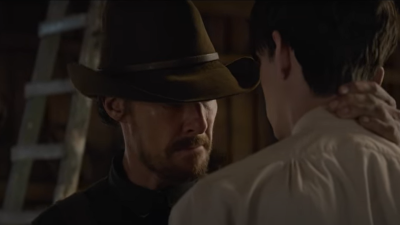

 like Terrence Malick: they don’t make a lot of films, but, when they do, it’s treated as the second coming. It probably doesn’t help that I wasn’t a fan of The Piano, but I honestly don’t see what all the fuss is about.
like Terrence Malick: they don’t make a lot of films, but, when they do, it’s treated as the second coming. It probably doesn’t help that I wasn’t a fan of The Piano, but I honestly don’t see what all the fuss is about.
That’s not to say that there isn’t a lot to admire about The Power of the Dog, which is a lush, complex and brutally visceral story that features some incredible production values and performances. Campion adapted the screenplay from Thomas Savage’s novel (which I’m told is excellent), which is set in Montana in 1925 and focuses on two ranching brothers, Phil and George Burbank, played by Benedict Cumberbatch and Jesse Plemons. Despite having the same background, Phil and George could not be more different. Phil is cocky and abrasive, while George is introspective and sweet. Phil is a consummate bully, looking for any reason to belittle anyone he perceives as either inferior to him or some kind of a threat. So, when George takes a liking to Rose, a widow innkeeper, played by Kirsten Dunst, Phil takes the opportunity to mercilessly and cruelly tease her, along with her effeminate grown son, Peter, played by Kodi Smit-McPhee. As the story unfurls, we learn what’s behind Phil’s cruelty and find that Rose and Peter may not be as weak as Phil may believe.
While the story is fascinating—I wish I had read the book instead of watched the movie—the problem is Campion sucks all the energy out of it with her overly pensive and meditative approach to the deeper themes that swirl below the surface. The only thing swirling in this film were my eyes, wondering how much longer it could go on with virtually nothing happening.
But, to be fair, that’s exactly what Campion was going for. She wants you to believe that there’s nothing going on, she wants to lull you into complacency, before bringing down the hammer in the final section of the film, which pulls everything together. Unfortunately, by that time, it was too late to get me back and, in fact, only made me angrier that the film was SO cagey. I love movies that don’t insult the audience’s intelligence, but don’t make me feel like a total idiot because I couldn’t see what was happening. Being coy is one thing, it’s quite another to be totally oblique.
Despite all that, though, the performances and the design elements are first-rate. Cumberbatch is as good as he’s ever been, somehow even managing to pull off playing a macho American cowboy, something I would never have guessed he could do. He is an exceptional actor and delivers exactly as required, it’s not his fault that I spent most of the film saying to myself, “what is HIS problem?” Plemons and Dunst are strong, as always, and, even though it took me a bit to warm up to McPhee, he did a good job and delivered exactly what was needed.
The gorgeous photography by Ari Wegner and the haunting score by Jonny Greenwood will certainly not be forgotten at Oscar time. Of course not, because The Power of the Dog is a film that is truly only for those who REALLY love movies—intense, cerebral, meditative and purposeful films that take their sweet time. Yes, The Power of the Dog requires a ton of patience, but those who really dig these kinds of meaty, contextual and complicated stories that avoid anything obvious and don’t mind a slow walk to get there will absolutely love this film. For me, though, it was a missed opportunity to tell a good story in a much better way.
